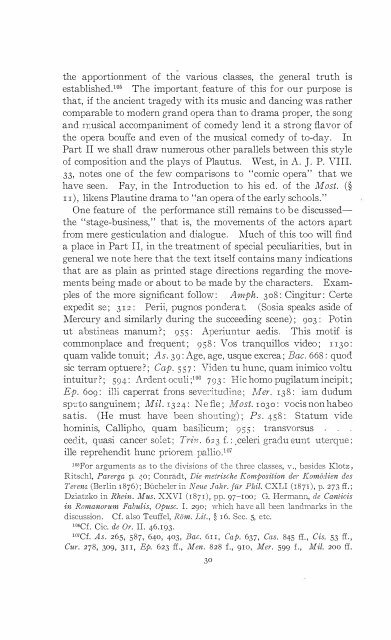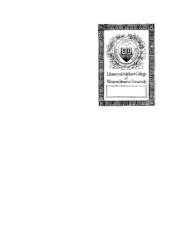Create successful ePaper yourself
Turn your PDF publications into a flip-book with our unique Google optimized e-Paper software.
the apportionment of the various classes, the general truth is<br />
established.l°5 The important feature of this for our purpose is<br />
that, if the ancient tragedy with its music and dancing was rather<br />
comparable to modern grand opera than to drama proper, the song<br />
and lLusical accompaniment of comedy lend it a strong flavor of<br />
the opera bouffe and even of the musical comedy of to-day. In<br />
Part II we shall draw numerous other parallels between this style<br />
of composition and the plays of Plautus. West, in A. J. P. VIII.<br />
33, notes one of the few comparisons to "comic opera" that we<br />
have seen. Fay, in the Introduction to his ed. of the Most. (§<br />
II) , likens Plautine drama to "an opera of the early schools."<br />
One feature of the performance still remains to be discussedthe<br />
"stage-business," that is, the movements of the actors apart<br />
from mere gesticulation and dialogue. Much of this too will find<br />
a place in Part II, in the treatment of special peculiarities, but in<br />
general we note here that the text itself contains many indications<br />
that are as plain as printed stage directions regarding the movements<br />
being made or about to be made by the characters. Examples<br />
of the more significant follow : Amph. 308 : Cingitur : Certe<br />
expedit se ; 3 I 2 : Perii, pugnos pondera t. (Sosia speaks aside of<br />
Mercury and similarly during the succeeding scene) ; 903: Potin<br />
ut abstineas manum ?; 955 : Aperiuntur aedis. This motif is<br />
commonplace and frequent ; 958 : Vos tranquillos video ; II30 :<br />
quam valide tonuit ; As. 39 : Age, age, usque excrea ; Bac. 668 : quod<br />
sic terram optuere ?; Cap. 557: Viden tu hunc, quam inimico voltu<br />
intuitur ?; 594: Ardent oculi ;lo6 793: Hic homo pugilatum incipit ;<br />
Ep. 609 : illi caperrat frons seve::itudine ; l'der . 138: iam dudum<br />
spt.:to sanguinem ; Mil. 1324: Ne fle ; Iv1.ost. 1 030 : vocis non habeo<br />
satis. (He must have been shouting) ; PS . 458 : Statum vide<br />
hominis, Callipho, quam basilicum ; 955 : transvorsus<br />
cedit, quasi cancer solet ; Tri11 . 62.3 f. : ,celeri gradu (?unt uterque :<br />
ille reprehendit hunc priorem pallio.l°7<br />
!O'For arguments as to the divisions of the three classes, v., b8sidcs Klotz ,<br />
Ritschl, Parerga p. 40; Conradt, Die me!rische Kcmposition del' Komodien des<br />
Terenz (Berlin 1876) ; Buchclcr in Neue Jahr. fur Phil. CXLI (1871), p. 273 ff. ;<br />
Dziatzko in Rhein. Mus. XXVI (18 71), pp. 97-100 : G. Hermann, de Canticis<br />
in Romanorum Fabulis, Opusc. I. 290; which have all been landmarks in the<br />
discussion. Cf. also Teuffel, Rom. Lit., § 16. Sec. 5, etc.<br />
I06 C£. Cic. de Or. II. 46.193.<br />
!07Cf. As. 265, 5 87, 640, 403, Bac. 61 1, Ca p. 637 , Cas. 845 ff., Cis. 53 ff. ,<br />
Cur. 278, 309, 31 I, Ep. 623 ff., Men. 828 f., 910, Mer. 599 £ ., Mil. 200 ff.<br />
30
















